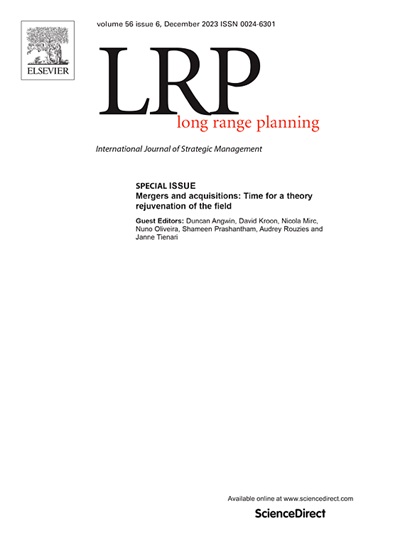The multifaceted government influence on CSR activities: CSR decoupling in an emerging market
IF 6.3
2区 管理学
Q1 BUSINESS
引用次数: 0
Abstract
Corporate social responsibility (CSR) decoupling — the misalignment between reported and actual CSR performance — represents a significant challenge in emerging markets. While existing research treats government as a monolithic entity in shaping CSR practices, we argue that varying priorities across governmental levels create multiple government demands that systematically affect firms' CSR decoupling behaviors. Drawing upon neo-institutional theory, we examine how administrative hierarchical distance influences CSR decoupling in China’s regionally decentralized authoritarian regime. Using data from Chinese publicly listed companies, we find that greater administrative hierarchical distance increases firms' propensity to engage in CSR decoupling. This relationship is attenuated in regions with more developed institutions and economies. Our study advances neo-institutional theory by demonstrating how vertical complexity within governmental systems shapes organizational responses to institutional pressures. These findings extend our understanding of CSR decoupling in emerging markets by revealing how layered governmental influences, rather than unified governmental pressure, affect firms' CSR practices.
政府对企业社会责任活动的多重影响:新兴市场的企业社会责任脱钩
企业社会责任(CSR)脱钩——报告的CSR表现与实际的CSR表现不一致——是新兴市场面临的一个重大挑战。虽然现有研究将政府视为塑造企业社会责任实践的单一实体,但我们认为,各级政府不同的优先事项会产生多种政府需求,从而系统地影响企业的企业社会责任脱钩行为。本文以新制度理论为基础,考察了行政层级距离对中国区域分权专制体制下企业社会责任脱钩的影响。利用中国上市公司的数据,我们发现行政层级距离越大,企业社会责任脱钩的倾向越大。在机构和经济较发达的地区,这种关系较弱。我们的研究通过展示政府系统内的垂直复杂性如何影响组织对制度压力的反应,推进了新制度理论。这些发现通过揭示分层的政府影响(而不是统一的政府压力)如何影响企业的企业社会责任实践,扩展了我们对新兴市场企业社会责任脱钩的理解。
本文章由计算机程序翻译,如有差异,请以英文原文为准。
求助全文
约1分钟内获得全文
求助全文
来源期刊

Long Range Planning
Multiple-
CiteScore
13.00
自引率
7.10%
发文量
75
期刊介绍:
Long Range Planning (LRP) is an internationally renowned journal specializing in the field of strategic management. Since its establishment in 1968, the journal has consistently published original research, garnering a strong reputation among academics. LRP actively encourages the submission of articles that involve empirical research and theoretical perspectives, including studies that provide critical assessments and analysis of the current state of knowledge in crucial strategic areas. The primary user base of LRP primarily comprises individuals from academic backgrounds, with the journal playing a dual role within this community. Firstly, it serves as a platform for the dissemination of research findings among academic researchers. Secondly, it serves as a channel for the transmission of ideas that can be effectively utilized in educational settings. The articles published in LRP cater to a diverse audience, including practicing managers and students in professional programs. While some articles may focus on practical applications, others may primarily target academic researchers. LRP adopts an inclusive approach to empirical research, accepting studies that draw on various methodologies such as primary survey data, archival data, case studies, and recognized approaches to data collection.
 求助内容:
求助内容: 应助结果提醒方式:
应助结果提醒方式:


